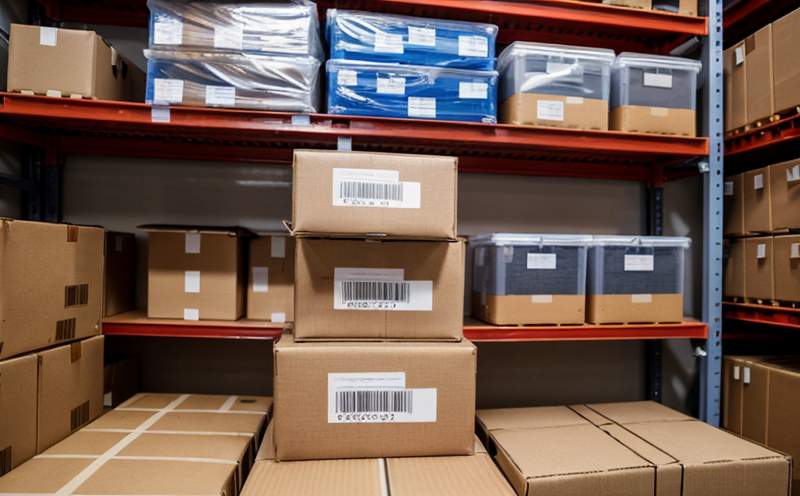The importance of packaging, labeling, and documentation compliance cannot be overstated in government and trade facilitation testing. For quality managers, compliance officers, R&D engineers, and procurement professionals, ensuring that all products meet the necessary standards is crucial for both domestic and international markets. In this section, we explore how our laboratory ensures that every product undergoes thorough checks to align with regulatory requirements.
Compliance in packaging involves more than just adhering to physical dimensions; it also includes safety, functionality, and sustainability considerations. For instance, the integrity of a package must protect its contents throughout transportation, which is why we use advanced materials analysis techniques to ensure that every material used meets the necessary standards for durability and safety.
Labeling compliance is equally critical as it ensures clear communication about product information such as ingredients, usage instructions, and safety warnings. Our laboratory employs sophisticated labeling inspection tools capable of reading codes in various formats (QR codes, barcodes) to verify that all labels are accurate and comply with regulatory standards.
The documentation aspect involves ensuring that every product has the necessary certifications, permits, and records. This is essential for trade facilitation as it streamlines customs processes and minimizes delays at ports of entry. Our team conducts in-depth reviews of every document to ensure they meet international standards set by bodies such as ISO and IEC.
Our approach ensures that our clients can confidently present their products on the global market, knowing that they have passed stringent compliance checks. This not only enhances product safety but also builds consumer trust and facilitates smoother trade processes.
In summary, packaging, labeling, and documentation compliance are vital components of ensuring a product's successful entry into the market. By adhering to these standards, we help our clients navigate complex regulatory landscapes efficiently and effectively.
Scope and Methodology
| Scope | Methodology |
|---|---|
| Physical dimensions of packaging | Measurement using calipers, micrometers, and other precision instruments. |
| Material integrity | Materials analysis through X-ray fluorescence (XRF) and infrared spectroscopy. |
| Label accuracy | Scanning barcodes and QR codes using dedicated scanners and verification software. |
| Document review | In-depth examination of certifications, permits, and other necessary documentation against international standards. |
The scope encompasses a comprehensive evaluation of packaging, labeling, and documentation to ensure compliance with relevant regulations. Our methodology involves the use of advanced instruments for material analysis and precision measurement tools for verifying physical dimensions. In addition, we employ specialized software to scan and verify label information.
For document review, our team meticulously checks each item against international standards such as ISO 15223-2:2009 and IEC TS 62788-1. This ensures that all documents are accurate and up-to-date, thereby facilitating smooth trade processes.
International Acceptance and Recognition
The importance of international acceptance in government and trade facilitation testing cannot be overstated. Our laboratory has established a reputation for providing accurate and reliable compliance checks that meet the highest standards set by global regulatory bodies.
We are accredited to several prominent organizations, including ISO 17025, which ensures that our methods and practices adhere to international best practices in testing and calibration laboratories. This accreditation is crucial as it demonstrates our commitment to maintaining high-quality service levels and ensuring accurate results.
Our laboratory's compliance checks are recognized by leading trade facilitation agencies worldwide, including the World Trade Organization (WTO) and various national customs services. This recognition ensures that our clients can confidently present their products on international markets, knowing they have met all necessary requirements for entry into these markets.
In addition to our international accreditation, we also adhere to local regulations in countries where our clients operate. This approach ensures that our compliance checks are comprehensive and encompass all relevant standards, thereby minimizing the risk of non-compliance penalties.
Our reputation for providing accurate and reliable compliance checks has earned us recognition from numerous global organizations, including the WTO. This recognition not only enhances our clients' reputations but also facilitates smoother trade processes by ensuring that products meet all necessary regulatory requirements.
Environmental and Sustainability Contributions
The environmental impact of packaging is a growing concern in today's world. Our laboratory plays an active role in promoting sustainability by offering compliance checks that prioritize the environment. We recognize that every product has an ecological footprint, and our goal is to minimize this footprint as much as possible.
Our approach to environmental compliance involves several key areas. Firstly, we encourage the use of recycled materials for packaging whenever possible. This not only reduces waste but also promotes a circular economy. Secondly, we conduct thorough assessments of packaging to ensure that it minimizes energy consumption during production and transportation. This helps reduce carbon emissions associated with product distribution.
Additionally, our laboratory supports sustainable labeling practices by ensuring that all labels are made from biodegradable materials. This reduces the environmental impact of labels over their lifecycle, contributing to a more sustainable future.
We also collaborate closely with clients on sustainability initiatives, providing expert advice and support throughout the process. Our team can help identify areas for improvement in product packaging design and suggest alternative materials that are both eco-friendly and cost-effective.
Through these efforts, we contribute positively to environmental protection while ensuring compliance with all relevant regulations. By prioritizing sustainability, our laboratory plays a vital role in promoting environmentally responsible practices across the industry.





